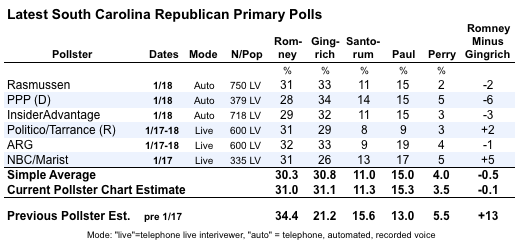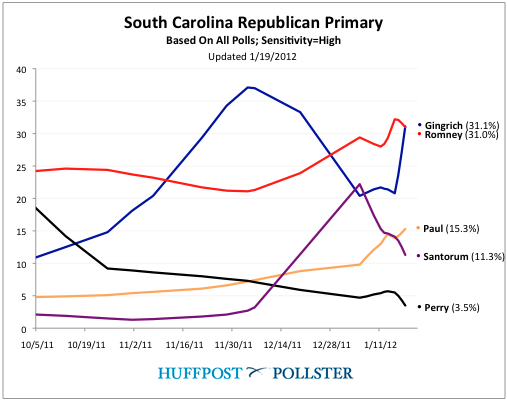Since I posted this morning, four more South Carolina polls have come in, three of which were in the field entirely after Monday’s debate. Each of the three most recent polls has Newt in the lead, albeit within the polls’ margin of error. Note that all three are automated polls, which may or may not be significant. Mark Halperin conveniently summarizes them for us at his Pollster.com website:

As you can see, they support my earlier assertion that Newt has pulled into a de facto tie with Mitt two days before Saturday’s South Carolina primary. Note that Newt has pulled even despite the fact that Romney’s support is holding pretty steady. This is really a case of the late deciders all breaking for Newt after Monday’s debate. If the trend lines hold, Gingrich is poised to eke out a narrow victory, which would put a crimp in the pundits’ prevailing narrative.

But that’s a big “if” given two additional developments since I posted. First, Rick Perry gave a strong endorsement for Newt, saying, “I believe Newt is a conservative visionary who can transform our country. We’ve had our differences, which campaigns will inevitably have, and Newt is not perfect, but who among us is?” As I indicated this morning, I don’t think this will provide a huge boost to Newt’s likely support, although even a modest boost may be critical in a close race. But what it does do is provide some political insulation for Newt against any fallout from today’s second big story: ABC’s interview with Gingrich ex-wife Marianne (the second one). Among the explosive allegations purportedly contained in the interview, perhaps none is bigger than the report that Newt asked Marianne for an “open marriage” so that he could be with Callista (now his third wife) without divorcing Marianne. It’s hard to say what impact, if any this story will have. Obviously this steps on the Perry endorsement, which is not great news for Newt, but will it actually cost him votes? I suspect it will give some social conservatives pause – but I simply don’t know how many will reconsider supporting Newt. My gut says not many – the same gut that said Rick Perry would be a strong candidate, mind you.
In this regard, a greater proportion of women than men are undecided about Newt’s candidacy, according to the latest polls. On the other hand, there’s the possibility that conservatives will seek this as a thinly veiled plot by the “liberal” media to destroy Newt’s candidacy. And, of course, there will be the inevitable questioning of Marianne’s motives – why now? What’s in it for her? Who is really behind the story? I don’t pretend to know the answer to any of these questions, but I’m pretty sure it will come up in the form of a question at tonight’s debate. If so, Newt has to turn the other cheek with his response. He should avoid questioning Marianne’s motives at all costs, and indeed mentioning her at all. Instead, he should repeat the Christian mantra: “I am not worthy. I ask for forgiveness.” Then he should remind voters it happened a long time ago, and proceed to wax eloquent about his wife, his grandchildren and his new found maturity. He should finish by saying, “Rick Perry was right when he endorsed me today. I’m not perfect. None of us are.”
Keep in mind that neither Santorum nor especially Romney can bring this issue up on their own, but they will certainly be given the opportunity to pile on. Romney in particular has to be careful in this regard – he can’t look like he’s trying to score points at Newt’s personal expense. A simple, “it’s something each voter must think about in her heart” will suffice. Then he damn well better go on the offensive about all of Newt’s other baggage: immigration, ethics violation, Fannie Mae, etc.
On any other day, of course, the big story would be the belated acknowledgment that Rick Santorum had won in Iowa (don’t give me any of the media’s CYA “virtual tie” crap). Poor Rick! As it is his poll numbers have been dropping, and this may well be his last debate. At this point there’s not a lot he can do to reverse those numbers, I don’t believe, short of major gaffes by Newt and Mitt. Paul, meanwhile, has to make sure his medication kicks in in time to prevent him from going on one of his Wacky Uncle diatribes regarding currency, the Fed and how we are going to withdraw into Fortress America, with defense bases dotting the countryside. He needs to stick with what got him here: deficit reductions, spending cuts and LIBERTY! Although, as I look at the polling numbers, I think his core support is so solid that he’s relatively immune to any fallout from a weak debate performance. Indeed, what I consider weak may not even matter to Paul’s true believers. He’s going to get his 15%, medication or not.
I’ll be on at 7:50 for the live blog. It promises to be a good one. Please join in….
